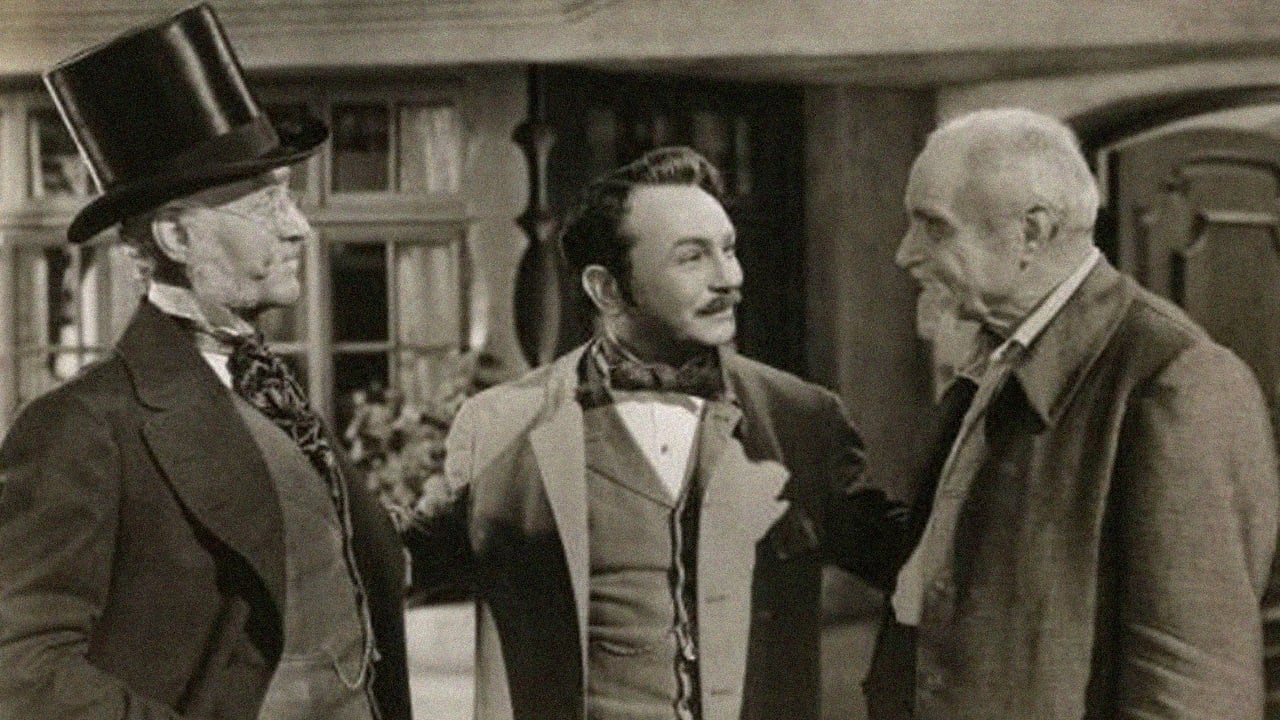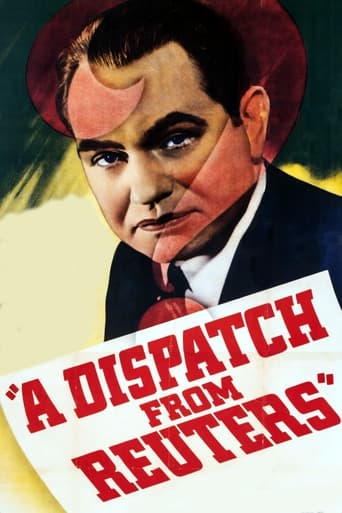Lancoor
A very feeble attempt at affirmatie action
FuzzyTagz
If the ambition is to provide two hours of instantly forgettable, popcorn-munching escapism, it succeeds.
Griff Lees
Very good movie overall, highly recommended. Most of the negative reviews don't have any merit and are all pollitically based. Give this movie a chance at least, and it might give you a different perspective.
utgard14
Enjoyable Warner Bros. biopic about Paul Julius Reuter, the man who built the famous Reuters news service. Edward G. Robinson players Reuter. The movie covers his story from when he was using carrier pigeons up through the use of the telegraph. As is often the case with these biopics, he faces hardships and doubt from critics but perseveres. It's all pretty formulaic, I admit, but also undeniably entertaining. I was never bored. Eddie G's backed up by a fine stable of character actors, including Gene Lockhart, Otto Kruger, Nigel Bruce, and Albert Bassermann. Edna Best is the love interest and Eddie Albert plays Robinson's assistant. A solid cast. The subject matter may not lend itself to the most exciting story but they do a surprisingly good job keeping it interesting.
F Gwynplaine MacIntyre
I briefly worked for the Reuters news agency (in a very minor capacity) during the Cold War, so I was curious to see the film 'This Man Reuter', which purports to be a biopic of Paul Julius Reuter. I knew almost nothing about the agency's founder before I saw this film ... and now that I've seen it, I still know almost nothing about him. How much of this movie is true? I get the impression that very little of it is.The good news first: this is an extremely well-made Warner Brothers 'prestige' picture, expertly directed by the great William Dieterle and splendidly photographed by the legendary James Wong Howe. There are some fine montage sequences (by Don Siegel?), easily up to this studio's standard. (Warners always had the best montages.) There's a good supporting cast, and Edward G Robinson gives conviction and humanity to the leading role. I was even pleased to see a brief appearance by former silent-film comedian George Ovey.The bad news: in spite of all of the above, I still find myself wondering how much of this actually happened. We see Reuter (Robinson) in the mid-19th century, as a man obsessed with acquiring information and disseminating it as rapidly as possible. He begins by using a telegraph and carrier pigeons to collect the stock-market quotations, selling the information to a cartel of brokers. (Ovey appears during this pigeon sequence.) There's an amusing scene with Gene Lockhart as a broker who schemes to get one jump ahead of his rivals, and who is promptly outsmarted by Robinson. Lockhart was one of those character actors whom audiences liked to see humiliated and outsmarted. (Another such was Walter Catlett.) Lockhart is in good form here, but I suspect that he's portraying a fictional character.Another fictional character here, surely, is the hero's buddy Max, portrayed by Eddie Albert. I've always liked Albert and regretted that he never really clicked in films: he was typecast as the hero's earnest pal, and hardly got a chance to transcend that niche: he certainly doesn't transcend it here. I suspect that Jack Warner inserted the handsome Albert into this film as an attraction for female movie-goers who mightn't want to look at Edward G Robinson.SPOILERS COMING NOW. Inevitably, Reuter's empire prospers ... and here comes a climax which I well and truly suspect is Hollywood fiction. It's now April 1865, and there's still no transatlantic telegraph cable to replace the one that broke in 1858. With the Civil War raging in the U.S.A., Reuter has a rival in London who's receiving transatlantic despatches faster than Reuter can get them. Reuter comes up with a Heath Robinson system to shave a few minutes off his rival's time, by dropping messages overboard as ships reach the Irish coast, trusting them to wash ashore and be retrieved, then cabling the gen to London. Will Reuter's method work?Astoundingly, the very FIRST message that Reuter receives by this method is the assassination of Lincoln. (Which we see in one of the montages.) Is this true? Was the news of Lincoln's assassination indeed Reuter's first transatlantic despatch ... or merely his first major scoop? (Another big scoop -- the end of America's Civil War -- occurred only a few days before Lincoln's assassination, yet we get no mention of that here.) 'This Man Reuter' is a very enjoyable film, of the sort they don't make any more, but it has a strong aroma of Hollywood hokum rather than fact. I wish I knew how much of this movie was accurate. Purely for its entertainment value, I'll rate it 7 out of 10.
xerses13
The 'BIO PICTURE' was a staple of Warner Brothers (WB) from its inception. Now lets be clear about that, it does not mean historical accuracy. It was (and is) a form of entertainment that loosely uses real events and people and spins a story that was (and is) appropriate at the time of it's release. There is enough facts and truth in these productions to stimulate interest to those who wish to delve deeper. We suggest that A DISPATCH FROM REUTER'S may have a lot more in it then is shown on screen. For that you need to go to the library or catch something on one (1) of the educational channels.What is shown though is very entertaining. Edward G. Robinson plays 'Julius Reuter' who created the first world wide information system. His performance like all those when he was interested in the role is credible and sincere. Edna Best plays his wife 'Ida' and also delivers in a way that is believable. The supporting cast of WB contract players of the time all do their job. Photography by James Wong Howe and musical score by Max Steiner is what you come to expect for such a production, professional. As well as direction by William Dieterle who was the WB's director of choice during that period for the 'BIO' picture.The only fly in the ointment is the irritating performance of Eddie Albert's 'Max Wagner' as 'Reuter's' friend and irresponsible jerk. We will not catalog all 'Max's' shortcomings but lets just say this. Any normal business owner would have fired him or had him disappear by way of THE SOPRANOS! For some reason during the 30's and 40's this type of character was supposed to be endearing to the audience in a way that escapes us today. There is a parallel to this during that period known as the "idiot plot". A simple misunderstanding that if simply explained away would have solved everything in the first reel.Other then that we endorse watching this film. If you can also catch DR. EHRLICH'S MAGIC BULLET, do so. Mr. Robinson also stars in that one (1) and the film is a stronger drama with a tighter plot. Rating for DR. EHRLICH'S MAGIC BULLET IMDb**********Ten (10).
fscriva
Another gem from Hollywood's golden age, "A Dispatch From Reuters", tells the fascinating true story of Julius Reuter (played by the marvelous Edward G. Robinson), founder of the famous news agency, and who started to transmit information using pigeons. Impeccable production, was a distinguished addition to Warner's series of biopics, with fine cast and a typically wonderful music score by the brilliant Max Steiner.

